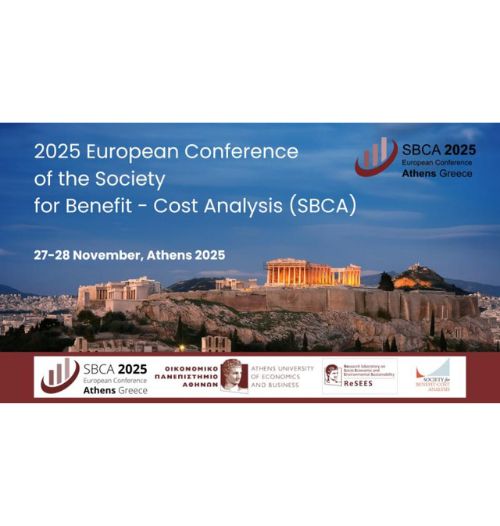SBCA Conference 2025: the economics of climate change
Home | Events | Policymakers | SBCA Conference 2025: the economics of climate change

Athens, Greece
The 2025 European Conference of the Society for Benefit-Cost Analysis (SBCA) takes place in Athens, Greece, on 27-28 November 2025. The Athens University of Economics and Business (AUEB) hosts the event through its Research Laboratory on Socio-Economic and Environmental Sustainability (ReSEES).
The conference promotes the use of benefit-cost analysis (BCA) in science as a tool to inform policy and investment decisions. A crucial mission at a time when the hidden costs of climate change increasingly threaten social well-being. We have discussed this very topic in our June workshop in Lecce on Biodiversity and Ecosystem Responses to Climate Change (https://www.lifewatch.eu/2025/06/13/biodiversity-ecosystem-responses).
In this context, advancing the theoretical foundations and empirical applications of sustainable development becomes essential. The SBCA 2025 aims to contribute to this effort by highlighting methodological excellence, promoting interdisciplinary collaboration, and practical applications of BCA for evidence-based decision-making.
Under the leadership of Professor Phoebe Koundouri, the conference will focus on environmental, natural resource, and energy issues. Director of ReSEES, and faculty member at AUEB’s Department of International and European Economic Studies, Prof. Koundouri is in fact internationally recognised for her innovative, human-centred, and interdisciplinary approaches for a sustainable interaction between nature, society, and the economy.
The conference will explore topics such as methodological advances in BCA, environment, climate, and energy policy, health and social policy evaluation, infrastructure and urban development, governance and regulation, and innovation, ethics, and social justice, opened by two keynote speeches:
- Anastasios Xepapadeas, Cost-Benefit Analysis under Climate Change: Fat Tails and Extreme Events
- Anna Alberini, The Benefits and Costs of Energy Assistance and Special Energy Pricing Programs
Together, they bring extensive expertise in climate change economics, growth and sustainability, cost-benefit analysis, and risk and uncertainty, econometrics, energy and environmental policy, health and safety economics, and non-market valuation.
There is still time to register at the Early Registration rate until 20 October. More information and registration details are available at https://sbca2025.aueb.gr.